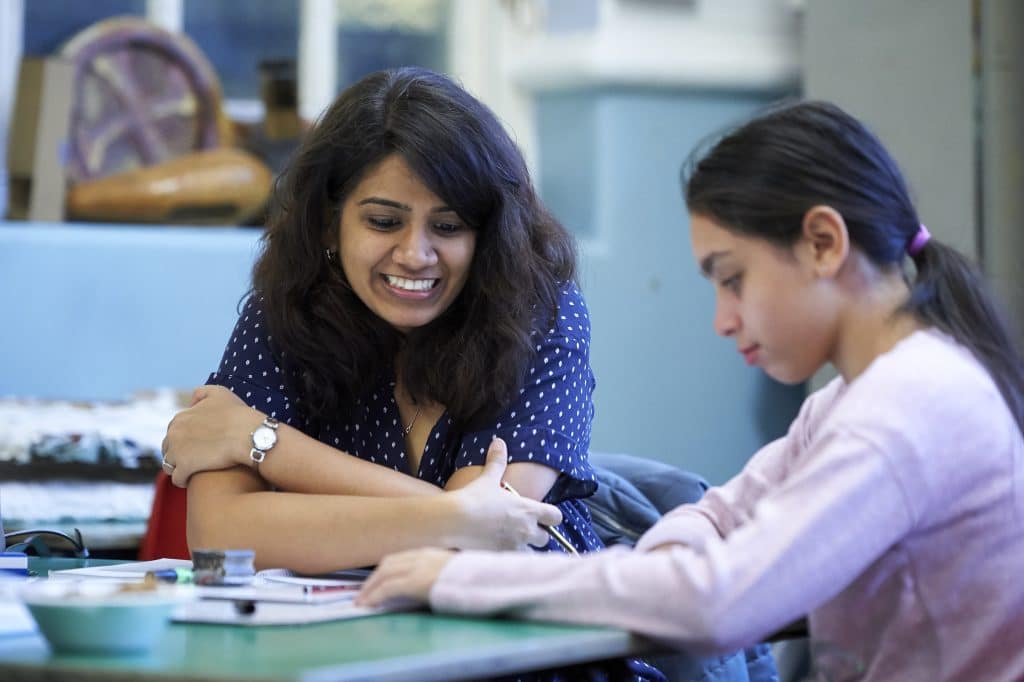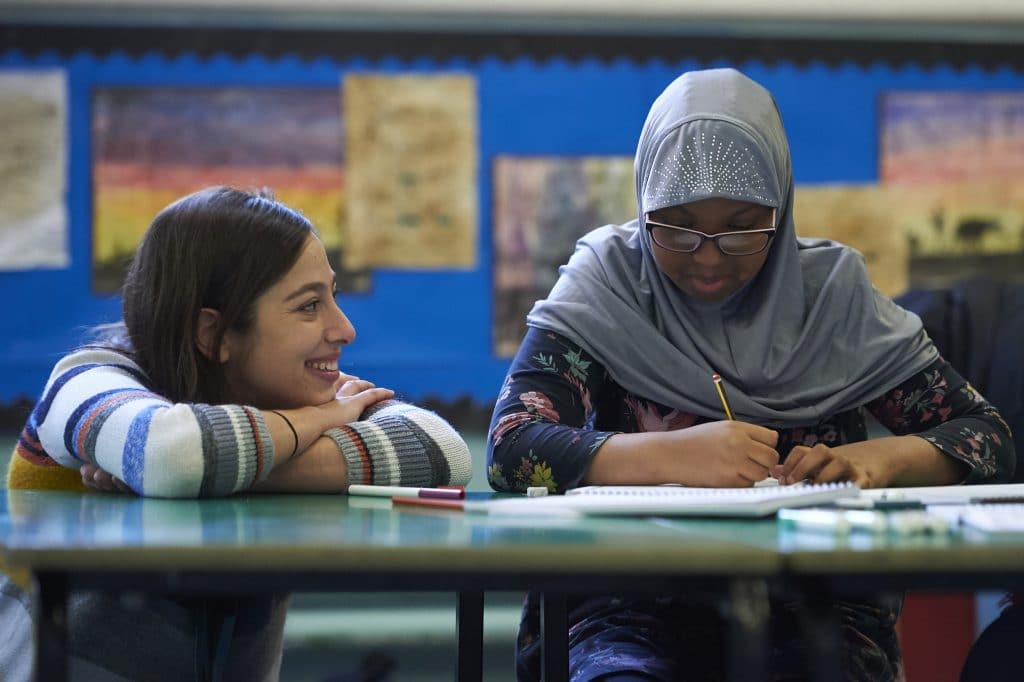Action Tutoring 2020-21 Impact Report
28 April 2022
We are excited to share our annual impact report, which celebrates the commitment of our amazing volunteers and the hard work of our partner schools!
2020-2021 has been a record breaking year for Action Tutoring; it more than doubled in size due to the ongoing pandemic. There was a 150% increase in tutors volunteering and 160% increase in pupils supported.
Action Tutoring is celebrating its 10th anniversary in 2022. Since it was officially registered as a charity in 2012, Action Tutoring has supported over 19,000 pupils with the help of over 9,000 volunteer tutors.
We owe a huge thank you to everyone who has supported us on our journey so far!
2020-2021 Impact Report
Our new impact report is both a reflection and a celebration. It is a reflection of the significant impact the pandemic has had on education, and the even greater challenges this has posed for disadvantaged pupils trying to reach their full academic potential.
But it is also a celebration of Action Tutoring’s 10 years of impact, recognising the achievements and evolution of delivery, and positioning itself for another decade of making a difference.
We are hugely proud of our impact and the programmes we have offered to our partner schools. Since we are always looking to expand our reach and help even more pupils, being evidence-based, one of our core values, is essential to us. Relying on data collection from schools, as well as our own baseline tests and interim assessments, ensures our support makes a real difference.
We are extremely proud to have partnered with 156 schools across the UK and deliver over 61,700 hours of tutoring by 2,749 committed volunteers who joined our cause and made this all possible.
Last year GCSE results were decided by teachers (teacher-assessed grades). Of those Action Tutoring pupils eligible for the Pupil Premium and who attended at least eight tutoring sessions in their subject, 81% achieved grade 4 or above in English and 80% achieved grade 4 or above in maths.
These pupils out-performed the national GCSE results for disadvantaged pupils (nationally 67% of disadvantaged pupils achieved a grade 4 or above in English and 62% for maths in 2020-21).
Read more: GCSE results 2021 – what does our data show about the academic performance of pupils?
School closures are likely to have reversed progress made to narrow the academic attainment gap in the last decade.
A recent EPI report found the disadvantage gap at GCSE is significant, and outcomes for the very poorest pupils in long-term poverty have failed to improve after a decade. That’s why our support and expertise in tutoring has never been more necessary; providing quality education to children from disadvantaged backgrounds will continue to be at the heart of everything we do.
The 2020-2021 Action Tutoring report recognises there is still a long way to go until education is a level playing field, but tutoring provides a tangible solution and has successfully proved that it can make a real difference in the lives of disadvantaged young people.
How you can help
Tackling education inequality, and social mobility, is only attainable through collective action. We need your help to ensure vulnerable pupils are given the opportunity to succeed.
The commitment we ask of our volunteers is one hour each week to tutor with us. If that is not possible, there are other ways to help our cause! For example, spread the word; you never know if your friends or family members would be interested in tutoring.
You can also support our organisation by donating. Every donation that we receive helps us to reach even more young people and have a positive impact on their education and their futures.
Follow us on our social media pages and stay up to date with the latest Action Tutoring news!
Action Tutoring Initial Training for volunteer tutors: what does it include?
26 April 2022
Action Tutoring’s goal is to make sure all our volunteers feel supported and receive the information and guidance they need in order to deliver high-quality tuition to children who need it.
Our education charity always strives to be transparent about the way we work and clear about our vision and mission. That’s why our Training and Curriculum team work relentlessly to ensure our volunteer tutors receive the training they need before their first session.
What does the Initial Training with Action Tutoring include?
Getting to know Action Tutoring
The first part of the training session is all about who we are, what we do and why we exist. This is a great way for our volunteers to better understand our mission and the impact of our work.
Not everyone is familiar with education inequality issues in the UK and the importance of free tuition in closing the attainment gap, so we feel this introduction makes our mission clearer to our volunteers. An understanding of the educational landscape in the UK will allow them to better communicate our cause to their friends and family and spread the word.
Understanding our resources and further training opportunities
Our volunteers don’t have to prepare learning activities for the tutoring sessions; our team has designed workbooks and resources, tailored to the national curriculum, for volunteers to use.
Following Initial Tutor Training, all tutors will get access to Looop, our training platform for tutors, within a week of attending Initial Tutor Training. There, they will be invited to complete ‘Compulsory Training for Online Tutors’ before the first session.
What is Looop? It is basically our online library where tutors can access our workbooks and pre-programme packs. There, tutors can also book onto ‘Introduction to Vedamo’ webinars, as well as complete optional bitesize training sessions called Bright Ideas to upskill as a tutor.
Read more: How tutors can support pupils with dyslexia
DBS check
The initial training with Action Tutoring also involves checking the DBS documentation of tutors. Since our charity works with vulnerable young people and children, an enhanced DBS (criminal record) check is required.
During the training, everyone is asked to have three documents ready for verification, or an existing DBS certificate, as well as a photo ID. Documents the government accepts for the DBS check are outlined clearly in an email before the training session.
Our expectations
Another important part of our training session is volunteers understanding what they can expect from us, and what we expect from our tutors. To maintain high standards and to ensure quality tuition, the Action Tutoring team routinely perform “spot check” observations in order to support our volunteers with any guidance they need to improve their sessions.
Safeguarding
The last part of the training involves getting familiar with safeguarding issues, which is all about protecting the safety of our pupils and preventing and responding accordingly.
When we discuss cases of abuse, we usually mention physical abuse, such as hitting or kicking, the most. What many don’t realise is that there are various types of abuse that people who work closely with children need to be aware of. You might be surprised to learn that online forms of abuse such as online grooming and cyberbullying are just as important and relevant as physical abuse.
Throughout this part, there will be interactive activities for our volunteers to better absorb the information and put their existing knowledge into practice.
Lastly, keep in mind that our amazing Programme Coordinators are always here to support our tutors in case they need further support during the sessions. Our volunteers have the opportunity to continue learning with us and further developing their skills until their last tutoring session.
Are you ready to join our volunteer team? We’d love to hear from you!
Stay up to date with our latest news and support our cause by following us on social media. This will help us create an even bigger online community and spread the word!
We are excited to share our new mission statement!
19 April 2022
As an education charity, our goal has always been to remain transparent, straightforward and clear about our mission and values to our amazing volunteers, funders and partner schools. That’s why we are excited to finally share our new mission statement with you.
Our new mission statement:
Action Tutoring unlocks the potential of children and young people who are facing disadvantage. We are tackling the attainment gap head-on by forging partnerships with schools nationwide. Our trained volunteer tutors are empowered to enable pupils to make meaningful academic progress, opening doors to future opportunities.
Having a meaningful impact on the lives of disadvantaged pupils requires us to always evaluate our work and reflect on our values. Putting our mission into words allows our charity to have a clear and well-focused vision for our future strategy.
We hope our new mission statement resonates with all of you who have supported us by giving your time to volunteer, donating or simply by spreading the word about our cause. We also hope it inspires new volunteers to join our cause and help us expand our reach.
Our vision as a charity is a world in which no child’s life chances are limited by their socio-economic background.
Tutoring has been proven to be an effective tool in tackling education inequality and making a real difference in the lives of young disadvantaged people. Watch the video below if you’d like to learn more about the impact of our work in 2020-21.
What has changed?
Geography
Since the creation of our first mission statement we have expanded to a number of new areas across the country and will continue to do so over the years. We included ‘nationwide’ to highlight this.
Highlighting our core focus
We specifically reference the attainment gap as this is the core focus of our delivery and also our advocacy work.
Robust training
We have developed a robust training and development model for our volunteers and we wanted to emphasise this and their crucial role in our work.
Inclusive and accessible communication
Lastly, Action Tutoring is proud to be an inclusive, equal opportunities organisation. That’s why we refreshed the language used to be warmer and more accessible.
We also realise that while mission statements can be powerful, they need collective action to make a real difference. Our team is dedicated to our cause and works hard to attract the very best volunteers from the most diverse and widest possible talent pool.
Action Tutoring values
As an education charity, having high standards is our priority. We always strive to maintain professional standards through all of our interactions with partner schools and volunteer tutors and aim to achieve excellence in all we do.
Being reflective is also part of our work culture; we regularly survey pupils, teachers and tutors to help inform improvements to the programme. We are hugely proud of our impact and the programme we offer but are always looking to make it even better.
We do so by being evidence-based and rely on data collection from schools, as well as our own baseline tests and interim assessments, to ensure our support is having an impact.
Since integrity is a core value of our organisation, we always share all pupil progress data with partner schools, even if the outcomes aren’t as hoped, and make our evaluation reports widely available.
In addition, we work hard to develop our training and resources to support our pupils, tutors and staff to be the best they can be. Being aspirational allows us to aim higher and offer further support to those who need it the most.
Lastly, partnerships with schools are at the heart of our model. We also regularly engage with our peer charities and organisations such as Teach First, Impetus and the Fair Education Alliance, to maintain a united force on tackling education inequality. Effective communication and a strong sense of collaboration has enabled us to gain our supporters’ trust and work closely with our partner schools.
Do you want to learn more about Action Tutoring? Read our story here.
We’re committed to ensuring more and more pupils can receive the education they deserve. We thank you all for your continuous support and hard work.
How tutors can support pupils with dyslexia
14 April 2022
One in ten children are diagnosed with dyslexia, a common learning difficulty that mainly causes problems with reading, writing and spelling.
Although children with dyslexia require additional personalised academic support, small adjustments to day-to-day practice can have a great impact on dyslexic pupils’ performance.
Knowing how to better interact, communicate and help dyslexic pupils is an important step to creating an inclusive classroom that promotes a healthier, safer learning environment for all children.
What exactly is dyslexia?
In the UK, children are primarily taught to read through phonics, which teaches
them to link sounds and letters. Experiencing difficulty in accurate and fluent word reading and spelling is the most visible symptom of dyslexia. However, a dyslexic pupil’s brain functions differently and they may not make the same connections between sounds and letters.
Pupils with dyslexia often try to recognise and memorise each word individually, rather than using phonics to decode them. They can experience visual stress and feel overwhelmed by bright colours and some fonts. This exposure can make pupils feel more stressed and lead to loss of comprehension.
How can tutors support pupils with dyslexia?
It’s important to keep in mind that dyslexic pupils are not less able or less intelligent. As dyslexia is often misunderstood or misdiagnosed, it should be clear that it does not affect intelligence or self-motivation.
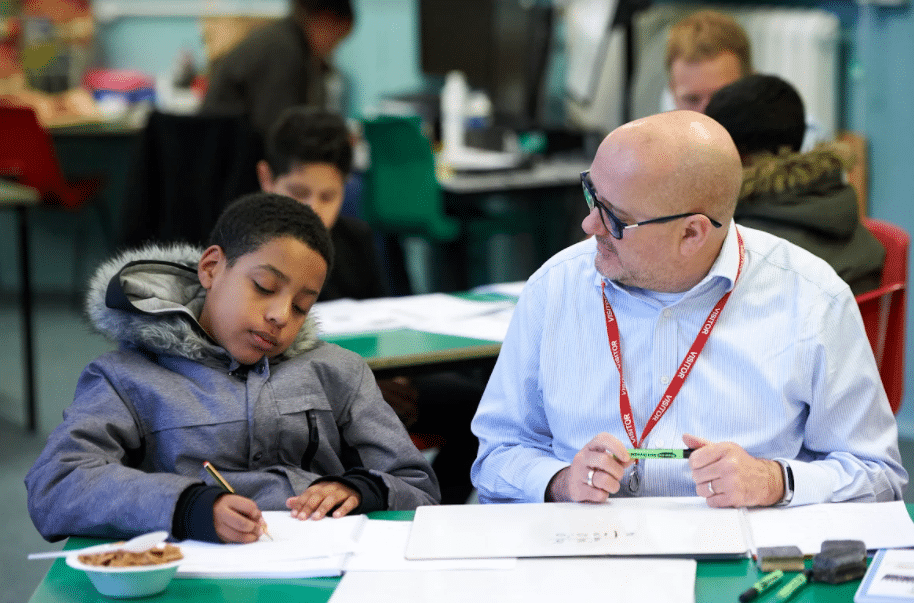
Be patient
As a general rule, keep in mind that dyslexic pupils need more time to process information and it’s best for them to do so at their own pace. This means that as a tutor, you should never insist that a dyslexic pupil reads out loud if you see them struggling, as they can be more self-conscious about their reading abilities.

Be encouraging
Dyslexic students will have emotional reactions to their learning difficulties, such as embarrassment for reading at a slow pace, lack of confidence due to misspelling words, confusion at not processing the information as quickly, and anger at not keeping up with their peers.
These feelings can create additional obstacles to their learning progress, so as a tutor it is important to always encourage and praise them for their work. This will help them feel emotionally safe during sessions and give them the confidence boost they need in order to show you their skills and talents! Dyslexic pupils can be artistic, athletic, and have excellent problem-solving and reasoning skills.
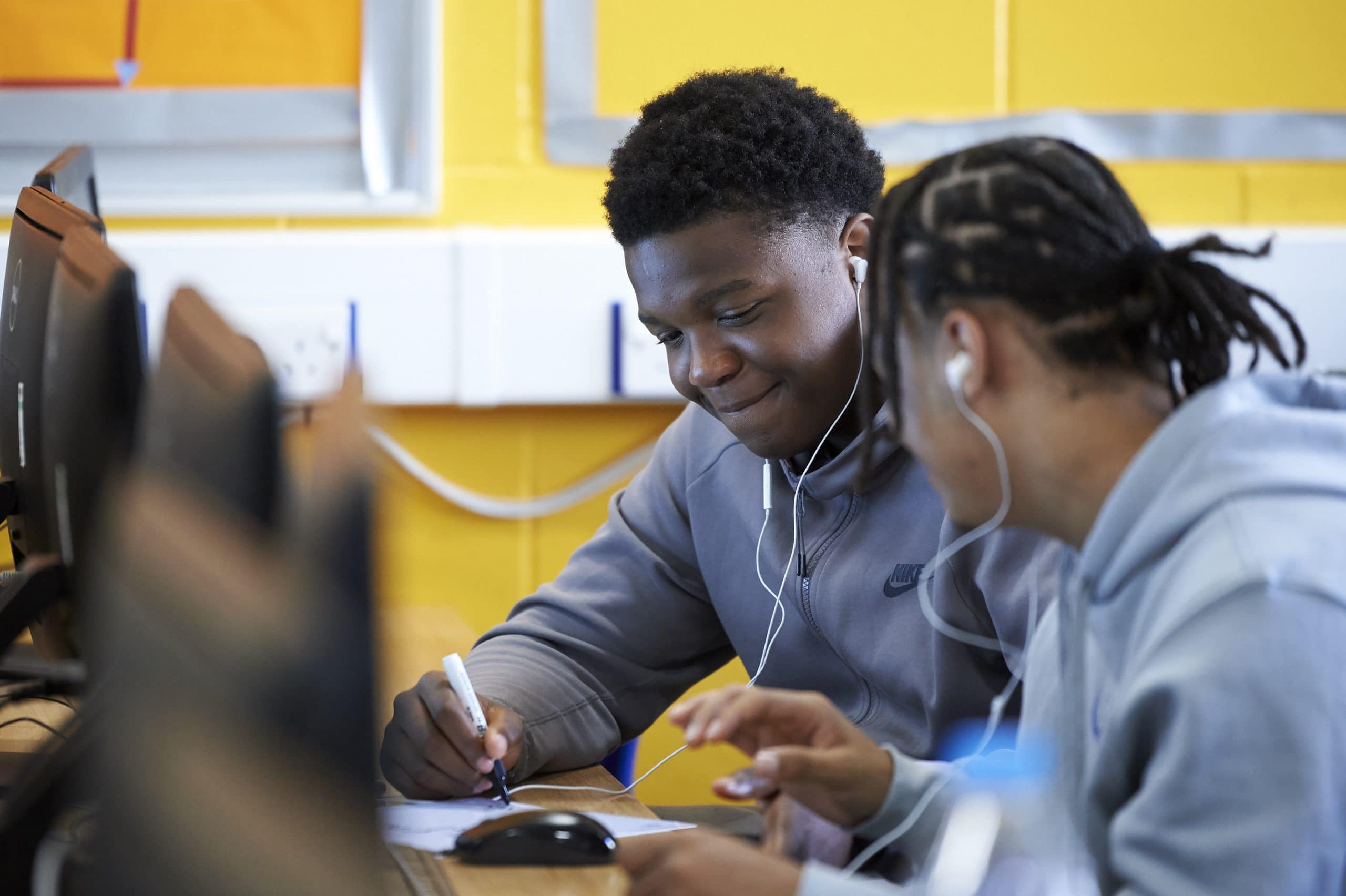
Don’t be scared to take breaks
Brain breaks are an important part of the tutoring session, because they give pupils the opportunity to focus better and be more productive. It’s a great way to reduce stress and frustration when they are unable to concentrate, engage or retain the information provided.
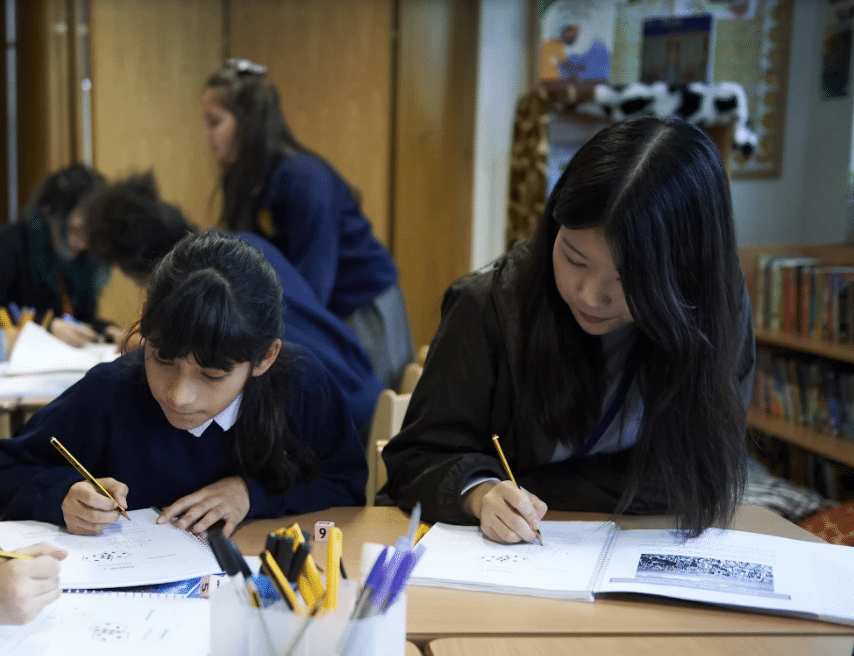
Cultivate the spirit of independent learning
As a tutor, it is essential to not only pass on knowledge, but to encourage pupils to enjoy the subject you’re tutoring. This will ignite their curiosity and motivate them to study independently. Dyslexic pupils might struggle to study on their own, but as a tutor you can help them with this by encouraging independence with the use of diaries, post-it notes and checklists.
What does Action Tutoring do to support pupils with dyslexia?
Our Training and Curriculum team has worked hard to create resources and further training for volunteer tutors to use. Tutors who join our volunteering group can access a series of online short courses called Bright Ideas.
One of them is Dyslexia and provides an overview of what Dyslexia is and suggests some strategies that tutors can use. The strategies are largely focused on how to tutor English, but some of them (for example, supporting pupils who struggle with working memory) will also be applicable to maths tutoring.
Read more: Nervous about your first tutoring session? These tips will help!
If you are part of our volunteering team, our amazing Programme Coordinators are always here to support our volunteer tutors in case they need further support.
By better understanding how dyslexic pupils think and behave, we are better prepared to offer them a more personalised learning experience. All pupils can succeed academically with the right combination of support and nurturing environment.
Volunteering with us can help you learn how to better interact with pupils and give you access to resources that can improve your communication and tutoring skills.
We’d love to hear from you!
How to celebrate World Health Day
7 April 2022
What is World Health Day?
World Health Day is a global awareness day that is celebrated every year on 7th April to honour the fundamental work of the World Health Organisation (WHO). It was celebrated for the first time in 1950, when the World Health Organisation was founded by the United Nations as the leading global health authority.
The mission of WHO is to address and deal with global health issues as well as control and combat diseases across the globe.
World Health Day is used not only as a celebration, but as an opportunity to shine light on the importance of taking care of our body and mind. With all that is going on in our world today, Action Tutoring encourages everyone to take a moment and reflect on the importance of a healthy lifestyle.
How can you celebrate World Health Day?
There are numerous ways for groups, organisations and individuals to commemorate World Health Day. They include creating better habits for your overall physical and mental health; educating yourself more on health issues; organising a local or online event to raise awareness; spreading the word on social media, or donating to charities that champion health, both physical and mental.
1. Volunteer for a cause you care about
Joining a volunteering community you are genuinely interested in can be a great start. Volunteering is an eye-opening experience that reminds us all to appreciate what we have, and practise gratitude.
Why not become a tutor in English or maths? Tutoring is not only an easy and rewarding way to make a difference to the lives of young people living in your community, but an excellent way to do something different and get out of your comfort zone.
One of our our amazing volunteers from Liverpool, Paige, notes that ‘’The impact you can have on a child’s life is one of the most rewarding things any volunteering could offer!’’
What exactly are the health benefits of volunteering?
Volunteering helps counteract the effects of stress, anger, and anxiety. Due to Covid restrictions, we have spent a lot of time isolating at home; this lack of social interaction can increase social anxiety and the feeling of isolation, even with restrictions now lifted. Volunteering is a great way to reduce stress and anxiety by giving you a sense of purpose and helping you gain perspective.
Volunteering is an excellent way to feel happier! Acts of kindness can help increase serotonin, energy, happiness, and your lifespan. The more we give, the happier we feel.
Being a volunteer helps us stay physically active. Research shows that volunteers tend to have a lower mortality rate compared to others. Volunteering can also help with symptoms of chronic pain and minimise the risk of heart diseases.
Older volunteers can incredibly benefit from volunteering since it is a great opportunity to walk more and generally be more active. If you are a retired professional, you can get involved with us as a volunteer tutor and help schools in your community provide better education to vulnerable children.
2. Practice mindfulness
Prioritising mindfulness should be an essential part of our daily routine in order to lead a healthy lifestyle. This allows us to practise the art of making space for ourselves – space to reflect and focus on what’s really important.
Being more present every day and paying attention to your thoughts and emotions, as well as to your surroundings, can greatly improve wellbeing.
3. Start educating yourself, and in turn, educate others
Information is key. World Health Day is a great opportunity to educate ourselves on how to improve our physical and mental health. Why not take some time to think about what your body and mind needs?
There are hundreds of tools online that can help you prioritise health and encourage healthier lifestyles. Do some research and ask others for advice. The more you learn about the importance of taking care of yourself physically and mentally, the more likely you are to take action sooner.
However, it’s essential to keep in mind that our general wellness and health is a year-round subject. Whether it’s some much-needed time for yourself to practise mindfulness or joining a volunteer group, there are numerous steps you can take in order to fuel your body and mind.
At Action Tutoring we have created a safe and inclusive place where our team members, volunteers, pupils and teachers can feel supported, heard and empowered. If you could spare an hour each week to help disadvantaged pupils receive further academic support in English and maths, we’d love to hear from you.
Action Tutoring is proud to receive the Rising Leader 2022 Headspace Award!
4 April 2022
Action Tutoring is happy to announce we have won the Rising Leader award in the 2022 “Headspace for Work” Mindful Workplace Awards!
Headspace, a mindfulness app, makes mediation easy and accessible for everyone through guided audio messages that aim to simplify the concept of meditating. With access to hundreds of exercises on everything from stress to sleep to focus and anxiety, it provides easy to use tools that can be used anywhere.
At Action Tutoring we have created a safe and inclusive working place where our team members are not only encouraged to progress and evolve professionally, but are also supported through any mental health-related challenges that may occur.
Action Tutoring defines success as cultivating a workplace where staff feel able to talk freely about mental wellbeing. We do this by having a mental health and wellbeing working group, which consists of 10% of our employees. They are all trained as Mental Health First Aiders (MFHAs), and offer one-to-one check-ins for any staff who wish to discuss their mental wellbeing. Through this we can prioritise emotional wellbeing and provide the necessary support to those who are struggling.
We began developing our wellbeing program in 2018. It was already well established by the time the pandemic began in March 2020, which as we all know, negatively impacted everyone in different ways. Our charity remained very conscious of the challenges our team was facing, such as anxiety, loneliness from working from home, screen fatigue, grief or sickness.
Adding Headspace for business to our organisation has helped us address mental health issues and support us in breaking the stigma. Our most recent wellbeing survey showed that 81% of staff agree or strongly agree with the statement ‘‘I feel confident talking to my manager about my mental wellbeing.’’
Headspace has not only contributed to supporting those with mental health challenges in our organisation, but also encourages a workplace culture of collaboration, compassion, and gratitude.
We are extremely proud of the award and recognition we have received as a charity, and mental wellbeing will continue to lie at the heart of what we do.
